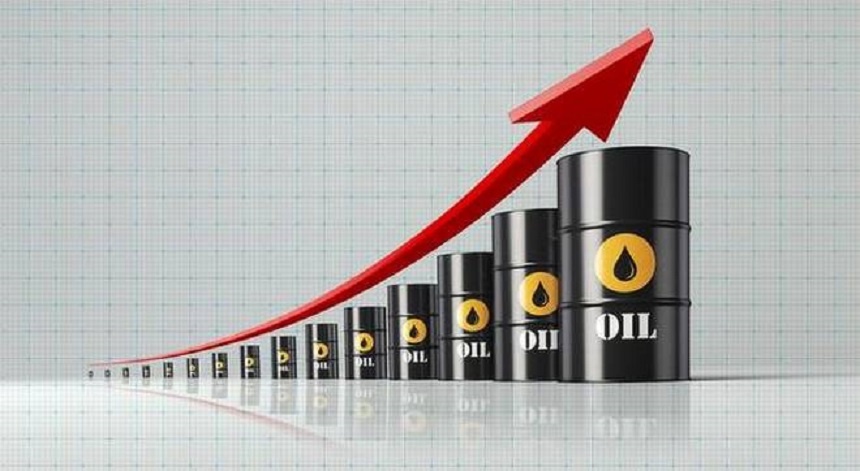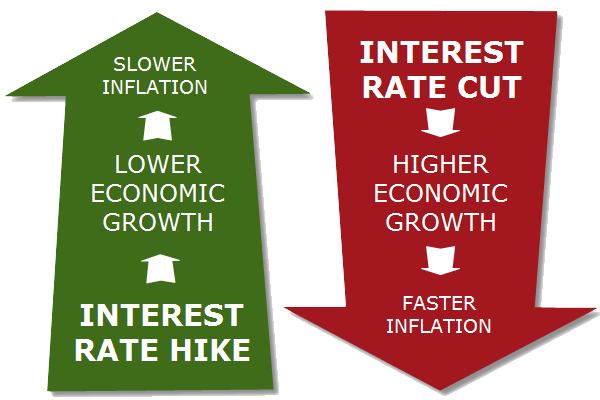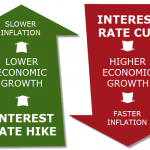Economy
Oil Market Soars 2% as US Targets Chinese Importers of Iranian Oil

By Adedapo Adesanya
The oil market was up by nearly 2 per cent on Wednesday due to concerns about global supplies after the United States issued new sanctions targeting Chinese importers of Iranian oil.
Brent crude futures grew by $1.18 or 1.8 per cent to $65.85 a barrel and the US West Texas Intermediate (WTI) crude futures expanded by $1.14 or 1.9 per cent to $62.47 per barrel.
The US on Wednesday issued new sanctions targeting Iran’s oil exports, including against a China-based small independent refineries known as teapots as President Donald Trump seeks to ramp up pressure on Iran and drive Iranian oil exports down to zero.
It imposed sanctions on a China-based independent teapot refinery it accused of playing a role in purchasing more than $1 billion worth of Iranian crude oil.
It was the second small independent Chinese refinery hit with sanctions by the Trump administration so far.
The US has not in the past focused on Chinese teapot refiners in part because they have little exposure to the US financial system.
The country also issued additional sanctions on several companies and vessels it said were responsible for facilitating Iranian oil shipments to China as part of Iran’s shadow fleet, adding that it is committed to disrupting all actors providing support to Iran’s oil supply chain, which it claims the regime uses to support its terrorist proxies and partners.
Normally, China does not recognize US sanctions and is the largest importer of Iranian oil. China and Iran have built a trading system that uses mostly Chinese Yuan and a network of middlemen, avoiding the dollar and exposure to US regulators.
However, Chinese state-run oil firms have stopped buying Iranian crude, on concerns of running afoul of sanctions.
The Organisation of the Petroleum Exporting Countries (OPEC) has received updated plans for Iraq, Kazakhstan and other countries to make further oil output cuts to compensate for pumping above agreed quotas.
The latest plan requires seven nations – Saudi Arabia, Russia, Iraq, the United Arab Emirates, Kuwait, Kazakhstan and Oman – to cut output by a further 369,000 barrels per day in monthly steps between now and June 2026, compared with an earlier plan running from March until next June, according to Reuters calculations.
Under the latest plan, monthly cuts will range from 196,000 barrels per day to 520,000 barrels per day from this month until June 2026, up from between 189,000 barrels per day and 435,000 barrels per day previously.
If successfully executed, the compensation plan would to a large extent offset a planned 411,000 barrels per day output increase being made by other members of OPEC+ in May.
US crude stockpiles rose while gasoline and distillate inventories fell last week, the Energy Information Administration (EIA) said, showing that crude inventories rose by 515,000 barrels to 442.9 million barrels in the week ended April 11.
Economy
CBN Retains Interest Rate Benchmark at 27.50%

By Adedapo Adesanya
The Monetary Policy Committee (MPC) of the Central Bank of Nigeria (CBN) has left the interest rates unchanged as it awaits more data to determine the inflation outlook.
According to an announcement by the Governor of the apex bank, Mr Yemi Cardoso, at the end of the 300th MPC meeting on Tuesday, the committee retained the Monetary Policy Rate (MPR) at 27.50 per cent, the Cash Reserve Ratio (CRR) at 50 per cent, and the Liquidity Ratio (LR) at 30 per cent.
This was widely expected as inflation cooled to 23.71 per cent in April 2025, according to the latest report by the National Bureau of Statistics (NBS).
Although at 23.71 per cent, the inflation levels remain elevated and strains on the Naira have only recently abated after an initial selloff in April caused by a slump in the price of oil, the country’s main export.
Business Post reports that the World Bank had recently projected that Nigeria’s inflation may moderate to 22.1 per cent this year, higher than the 15 per cent targeted by the Bola Tinubu-led administration.
There are also indications that if inflation slows down in the next two months, Nigeria might start cutting rates in the next half of 2025.
Nigeria may see “some room for the CBN to cut rates” in the second half of the year as disinflation is expected, Mr Gbolahan Taiwo, an analyst at JPMorgan Chase & Co. said in a client note.
The MPC meeting is the first rate-setting meeting since the US imposed a 10 per cent universal tariff and slapped China, Africa’s largest trading partner — with a 145 per cent levy before reducing it to 30 per cent for 90 days.
Economy
$1trn Economy: Edun Advocates Improved Capital Market Governance, New Products

By Adedapo Adesanya
The Minister of Finance, Mr Wale Edun, has emphasised the crucial role of the capital market in achieving the nation’s ambitious goal of becoming a one-trillion Dollar economy.
Speaking at the Capital Market Committee (CMC) meeting, the Minister highlighted the market’s transformation since 2015, noting that with improvements in governance structures, new products and platforms, a stronger regulatory environment, and growing investor participation, the capital market is capable of delivering Nigeria’s proposed $1 trillion economy.
Mr Edun, who was represented by the Minister of State for Finance, Mrs Doris Uzoka-Anite, said the implementation of the Capital Market Master Plan (2015-2025) had been instrumental in increasing the market’s contribution to the national economy, developing a sophisticated market structure, and improving competitiveness.
He said the revised plan prioritises digitalisation, innovation, sustainability, inclusion, and capital formation, aligning with the broader economic reform agenda, adding that the passage of the new act modernises the legal and regulatory framework, streamlines enforcement mechanisms, and provides clarity on emerging areas such as digital assets and crowdfunding.
On the challenges and opportunities inherent in the Act, the minister said it would help deepen market participation, and to ensure regulatory coordination remains tight.
The Minister noted that the government is committed to creating an enabling environment for private sector innovation to flourish within a fair and transparent environment, saying the market is expected to contribute to the economy, serving not only for capital raising but also as a vehicle for wealth creation, economic inclusion, and long-term national resilience.
The finance minister explained that with SEC undertaking regulatory reforms, including joining the GBMC Network of IOSCO in promoting and implementing ISSB Standards, among others, the domestic economy recorded the fastest GDP growth in about a decade in 2024, driven by a strong fourth quarter and improved fiscal position.
On his part, the Director-General of SEC, Mr Emomotimi Agama, emphasised the Commission’s commitment to regulatory reforms and capital market growth.
According to him, the enactment of the Investment and Securities Act (ISA) 2025 marks the beginning of a transformative new era for the capital market.
Mr Agama highlighted the commission’s efforts to deepen engagement with stakeholders, ensure widespread dissemination and understanding of the new law, and drive innovation and compliance.
He also emphasised the importance of restoring investor confidence, bringing timely relief to aggrieved investors, and creating a platform for broad-based participation of Nigerians in wealth creation, noting that the Commission has constituted an implementation team to thoroughly engage with every provision of the ISA 2025 and set up a dedicated sensitisation team to deepen public understanding of the new law.
He said a podcast series had also been launched to simplify the ISA 2025 and make it accessible to all Nigerians.
Mr Agama highlighted the Nigerian capital market’s impressive performance in 2024, with the NGX All-Share Index increasing by 37.65 per cent and market capitalisation growing by 53.39 per cent, noting the commission’s efforts to enhance regulatory efficiency, promote market integrity, and protect investors.
He emphasised the importance of financial inclusion and investor education, citing the commission’s initiatives to empower women, youth, and grassroots communities.
He also highlighted the commission’s commitment to technology-driven solutions, including the launch of an e-survey to assess emerging technology adoption in the Nigerian capital market.
Mr Agama emphasised the commission’s commitment to fostering growth, transparency, and sustainability in the capital market, and looked forward to fruitful deliberations at the meeting.
Economy
NIPOST Reactivates IMTO, Super Agent Licences to Offer Financial Operations

By Adedapo Adesanya
The Nigeria Postal Service (NIPOST) will deliver financial services across Nigeria and beyond, following the renewal of its International Money Transfer Operator (IMTO) and Super Agent licenses with the Central Bank of Nigeria (CBN).
This was disclosed by the Postmaster General and CEO of NIPOST, Mrs Tola Odeyemi, disclosed this during a Channels TV programme, monitored by Business Post on Monday.
According to her, the postal service is seeking to boost its revenue through the reactivation of these two services.
She also disclosed that NIPOST surpassed N10 billion last year driven by increased digital technology adoption.
According to her, the service has renewed its licenses with) and paid some fines to begin delivery of financial services after about eight years since the business was shut down.
“NIPOST has two licenses, a Super Agents license as well as an International Money Transfer Operator license. Unfortunately, something had happened with that IMTO license, and it was shut down for about seven, eight years.
“But last year, we were able to pay off all the fines, and it’s now back up,” she said.
Mrs Odetola said NIPOST has begun signing bilateral agreements with different countries to facilitate cross-border payments and remittance.
According to her, African countries are the main target because that is where most Nigerians face challenges in cross-border payments, revealing that some of Nigeria’s West African neighbours are already on board.
“Sending money from Cameroon to Nigeria is harder than sending money from the US to Nigeria. So, right now we have signed bilaterals with Togo, Benin, and I think a couple of other countries.
“There’s a particular agreement that right now is going through the justice system,” she said.
Speaking on the exceeding the N10 billion annual benchmark last year, Mrs Odetola said that the record would become insignificant with the new push into other businesses.
“We actually surpassed N10 billion last year, and that was just by digitizing some of our processes and plugging leakages.
“I think for the Nigerian Postal Service, N10 billion naira is a scratch,” she added.
According to her, the major services of NIPOST can generate much more for the nation, even as operations within the organization have been drastically optimized to ensure optimal service delivery that yields more revenue.
The Postmaster General highlighted several transformation strategies, including deeper integration with Nigeria’s fast-growing e-commerce space, expanding digital services like PostMoni, and leveraging the National Addressing System to boost financial inclusion and security.
She explained that if the Nigeria Police adopts NIPOST’s addressing framework, the Force can better combat crimes and improve emergency responses.
Recall that last week, NIPOST announced partnership with KLM Royal Dutch Airlines to improve international mail delivery services.
-

 Feature/OPED5 years ago
Feature/OPED5 years agoDavos was Different this year
-
Travel/Tourism9 years ago
Lagos Seals Western Lodge Hotel In Ikorodu
-

 Showbiz2 years ago
Showbiz2 years agoEstranged Lover Releases Videos of Empress Njamah Bathing
-

 Banking7 years ago
Banking7 years agoSort Codes of GTBank Branches in Nigeria
-

 Economy2 years ago
Economy2 years agoSubsidy Removal: CNG at N130 Per Litre Cheaper Than Petrol—IPMAN
-

 Banking2 years ago
Banking2 years agoFirst Bank Announces Planned Downtime
-

 Sports2 years ago
Sports2 years agoHighest Paid Nigerian Footballer – How Much Do Nigerian Footballers Earn
-

 Technology4 years ago
Technology4 years agoHow To Link Your MTN, Airtel, Glo, 9mobile Lines to NIN



















